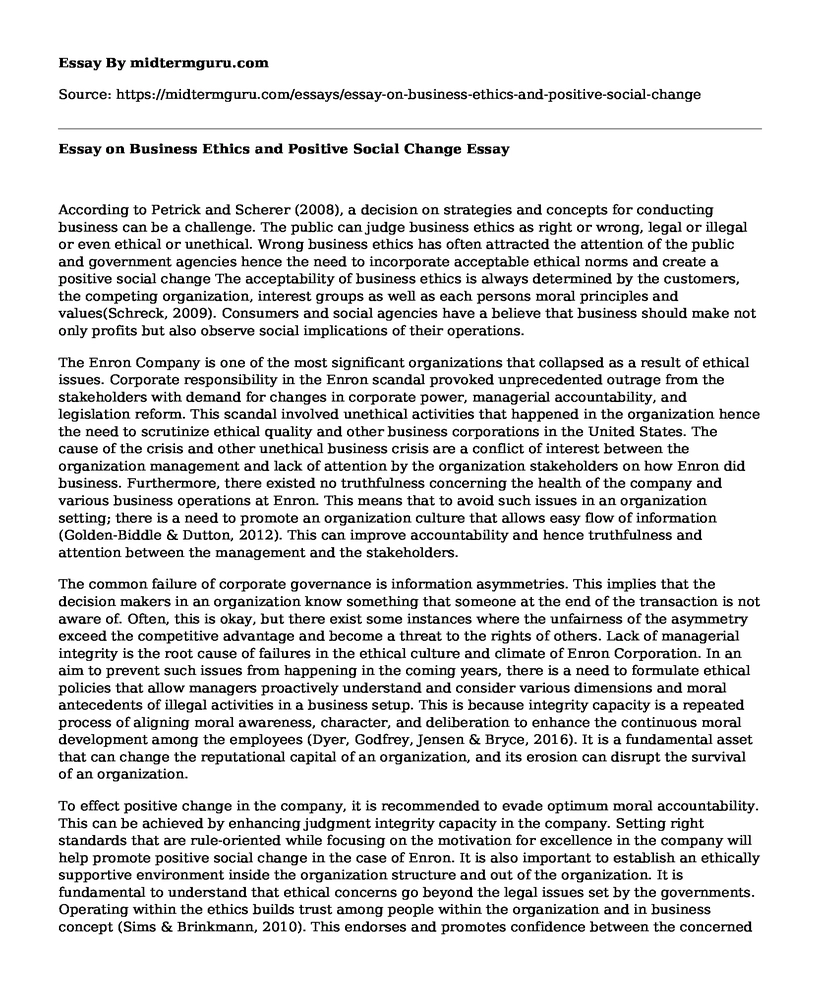According to Petrick and Scherer (2008), a decision on strategies and concepts for conducting business can be a challenge. The public can judge business ethics as right or wrong, legal or illegal or even ethical or unethical. Wrong business ethics has often attracted the attention of the public and government agencies hence the need to incorporate acceptable ethical norms and create a positive social change The acceptability of business ethics is always determined by the customers, the competing organization, interest groups as well as each persons moral principles and values(Schreck, 2009). Consumers and social agencies have a believe that business should make not only profits but also observe social implications of their operations.
The Enron Company is one of the most significant organizations that collapsed as a result of ethical issues. Corporate responsibility in the Enron scandal provoked unprecedented outrage from the stakeholders with demand for changes in corporate power, managerial accountability, and legislation reform. This scandal involved unethical activities that happened in the organization hence the need to scrutinize ethical quality and other business corporations in the United States. The cause of the crisis and other unethical business crisis are a conflict of interest between the organization management and lack of attention by the organization stakeholders on how Enron did business. Furthermore, there existed no truthfulness concerning the health of the company and various business operations at Enron. This means that to avoid such issues in an organization setting; there is a need to promote an organization culture that allows easy flow of information (Golden-Biddle & Dutton, 2012). This can improve accountability and hence truthfulness and attention between the management and the stakeholders.
The common failure of corporate governance is information asymmetries. This implies that the decision makers in an organization know something that someone at the end of the transaction is not aware of. Often, this is okay, but there exist some instances where the unfairness of the asymmetry exceed the competitive advantage and become a threat to the rights of others. Lack of managerial integrity is the root cause of failures in the ethical culture and climate of Enron Corporation. In an aim to prevent such issues from happening in the coming years, there is a need to formulate ethical policies that allow managers proactively understand and consider various dimensions and moral antecedents of illegal activities in a business setup. This is because integrity capacity is a repeated process of aligning moral awareness, character, and deliberation to enhance the continuous moral development among the employees (Dyer, Godfrey, Jensen & Bryce, 2016). It is a fundamental asset that can change the reputational capital of an organization, and its erosion can disrupt the survival of an organization.
To effect positive change in the company, it is recommended to evade optimum moral accountability. This can be achieved by enhancing judgment integrity capacity in the company. Setting right standards that are rule-oriented while focusing on the motivation for excellence in the company will help promote positive social change in the case of Enron. It is also important to establish an ethically supportive environment inside the organization structure and out of the organization. It is fundamental to understand that ethical concerns go beyond the legal issues set by the governments. Operating within the ethics builds trust among people within the organization and in business concept (Sims & Brinkmann, 2010). This endorses and promotes confidence between the concerned parties in a business relationship. Creating trust in an organization that has acted unethically is tough.
References
Dyer, J. H., Godfrey, P., Jensen, R., & Bryce, D. (2016). Strategic Management: Concepts and tools for creating real world strategy. Hoboken, NJ: John Wiley & Sons.
Golden-Biddle, K. & Dutton, J. (2012). Using a positive lens to explore social change and organizations (1st ed.). New York, NY: Routledge.
Petrick, J. & Scherer, R. (2008). Global Leadership, Capacity for Judgment Integrity, and Acculturated Organizational Knowledge. Performance Improvement Quarterly, 13(2), 97-116. http://dx.doi.org/10.1111/j.1937-8327.2000.tb00167.x
Schreck, P. (2009). The business case for corporate social responsibility (1st ed.). Heidelberg: Physica-Verlag.
Sims, R. R., & Brinkmann, J. (2010). Enron ethics (or: culture matters more than codes). Journal of Business Ethics, 45(3), 243-256.
Cite this page
Essay on Business Ethics and Positive Social Change. (2021, Jun 02). Retrieved from https://midtermguru.com/essays/essay-on-business-ethics-and-positive-social-change
If you are the original author of this essay and no longer wish to have it published on the midtermguru.com website, please click below to request its removal:
- Strategic Innovation at Fujitsu - Essay Sample
- Marketing Strategy Development - Research Paper Example
- Empowering Employees: Strategies for Leader Success - Essay Sample
- Motivating Employees: Manager's Guide to Enhancing Productivity - Essay Sample
- Knowledge and Learning in Business Success - Essay Sample
- Walmart: Service-Rendered Leadership Key to Success, Not Just Lower Prices - Essay Sample
- Improve Performance With DMAIC: A Six Sigma Process - Essay Sample







